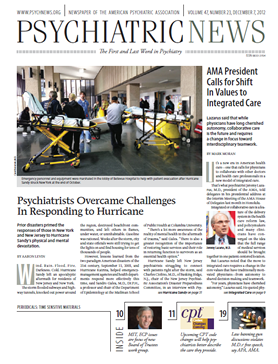Fetal and childhood exposure to maternal depression may be significant predictors of child behavior problems and may represent risk for long-term child psychopathology, reported a group of Canadian researchers in the November American Journal of Psychiatry.
Lead author Irena Nulman, M.D., an associate professor in the Department of Pediatrics at the University of Toronto and associate director of the Motherisk program at the Hospital for Sick Children in Toronto, and colleagues invited a group of pregnant women to help them separate the effects of maternal depression from the effects of its pharmacological treatment. The women were prospectively selected from among those who sought counseling from the Motherisk program about the pregnancy safety of various medications, and they agreed to allow follow-up evaluation of their children’s neurocognitive and behavioral abilities.
The children were classified into four groups: Those with prenatal exposure to the serotonin norepinephrine reuptake inhibitor (SNRI) venlafaxine; to selective serotonin reuptake inhibitors (SSRIs); to untreated maternal depression (having depressed mothers who discontinued pharmacotherapy before conception); and those with nondepressed, healthy mothers. The nondepressed pregnant women used as a control group called Motherisk to inquire about exposure to agents other than antidepressants, such as acetaminophen.
The resulting cohort consisted of the children of 62 mothers who took venlafaxine during pregnancy, 62 who took an SSRI (including 11 women who took sertraline, 20 who took paroxetine, 15 who took citalopram, 15 who took fluoxetine, and one who took fluvoxamine), 54 mothers who had untreated depression, and 62 nondepressed healthy women.
At the time of evaluation, the children ranged in age from 3 to nearly 7 and did not differ in gestational age or birth weight. The Wechsler Preschool and Primary Scale of Intelligence–Third Edition was used to evaluate the children’s intelligence, and behavior problems were measured by the Child Behavior Checklist and Conners’ Parent Rating Scale.
Their results indicated that children of depressed mothers who stopped taking antidepressants before pregnancy had IQs and rates of behavioral problems similar to those of children of mothers who took venlafaxine or SSRIs during pregnancy. IQs were lower in all of the children of depressed mothers—treated or not—and behavioral problems were somewhat more common in the children of depressed mothers. IQ differences in the children studied were not related to antidepressants, but rather were influenced by the mother’s IQ and the child’s sex, with girls having statistically significantly higher values on all IQ measures than boys.
Does that mean that treatment of depressed mothers is of no benefit to their children? Hardly, since children from all three groups exposed to maternal depression had more clinically problematic behavior than the children of the nondepressed women. Behavioral problems were associated with the severity of the mother’s depression not only during gestation but also during early childhood, clearly signifying the value to the child of treating the mother.
Nulman and her colleagues noted that 80 percent of the women who discontinued pharmacotherapy during pregnancy experienced an episode of depression in the first year after delivery, a result they said supports previous findings highlighting the significance of discontinuation of pharmacotherapy. “As a large body of research shows that postpartum depression is a significant risk factor for impaired cognitive and emotional functioning in children, the importance of treating maternal depression in pregnancy is hard to overestimate,” they said.
The study was funded in part by Wyeth-Ayerst Canada and the Mother-isk program.


